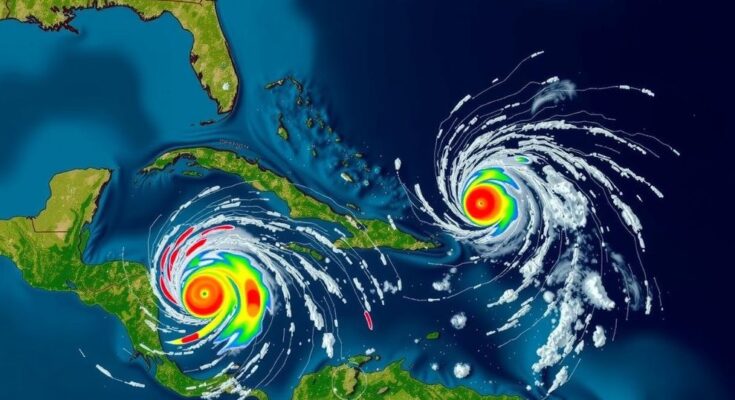The 2024 Atlantic hurricane season concluded with 11 hurricanes, surpassing the historical average of seven. Notably, Hurricane Beryl became the first Category 4 hurricane in June and Hurricane Helene caused over 200 fatalities. The season was marked by record rainfall and damages, further associated with climate change impacts on storm frequency and intensity.
The 2024 Atlantic hurricane season officially concluded on Saturday, marking a particularly intense period that resulted in extraordinary damage across many regions. With 11 hurricanes recorded, surpassing the average of seven, meteorologists characterized the season as “crazy busy,” largely attributed to unusually elevated ocean temperatures. Among the eight hurricanes that made landfall were Beryl, Helene, Milton, and Rafael, impacting areas such as the U.S. Gulf Coast, Bermuda, and the Caribbean.
Hurricane Beryl distinguished itself as the first Category 4 hurricane to emerge in June, wreaking havoc on Grenada before intensifying into a Category 5 hurricane on July 1. This instance deviates from the historical trend, as major hurricanes typically do not materialize until early September, according to the National Hurricane Center. The damage inflicted on Jamaica by Beryl included the destruction of infrastructure and resulted in fatalities, highlighting the storm’s severity.
September saw Hurricane Helene’s devastating impact across the southeastern United States, making it the deadliest storm on the mainland since Hurricane Katrina in 2005, with over 200 lives lost and an estimated $48.8 billion in damages in North Carolina alone. This storm also generated record rainfall, exacerbating flooding in states like Florida, Georgia, and Virginia.
In October, Hurricane Milton rapidly intensified with maximum wind speeds reaching 180 mph, categorizing it among the most powerful hurricanes recorded in the Gulf of Mexico. This season’s rainfall levels in regions like Asheville, Tampa, and Orlando reached unprecedented highs, further compounding the damage experienced in adversely affected areas. November ended with Hurricane Rafael approaching the strength of previous November hurricanes, once again straining recovery efforts in regions still reeling from earlier storms.
Analysis of this season has linked climate change to the increased frequency and intensity of hurricanes. The warming oceans, partly due to human-generated greenhouse gases, have created conditions conducive to the formation of more intense storms at unusual times. As hurricane researcher Brian McNoldy posited, “I do not ever point to climate change as causing a specific weather event, but it certainly has its finger on the scale and makes these extreme storms more likely to occur.
The Atlantic hurricane season is an annual occurrence characterized by the formation of tropical storms and hurricanes primarily affecting the Atlantic Ocean, the Gulf of Mexico, and the Caribbean Sea. Spanning from June to November, this period typically witnesses fluctuations in storm activity, influenced by various factors including ocean temperature, atmospheric conditions, and climate variability. Recent seasons have seen an increase in the frequency and intensity of hurricanes, prompting discussion about the impact of climate change on weather patterns and the formation of extreme weather events.
In conclusion, the 2024 Atlantic hurricane season has been marked by notable storms that both exceeded average numbers and demonstrated heightened intensity, leading to significant destruction and loss of life. Hurricane seasons appear to be responding to the ongoing effects of climate change, highlighting the urgent need for improved preparedness and response strategies. As researchers like Brian McNoldy have indicated, understanding the connection between climate factors and hurricane dynamics is crucial for future safeguards against such disasters.
Original Source: wsvn.com




